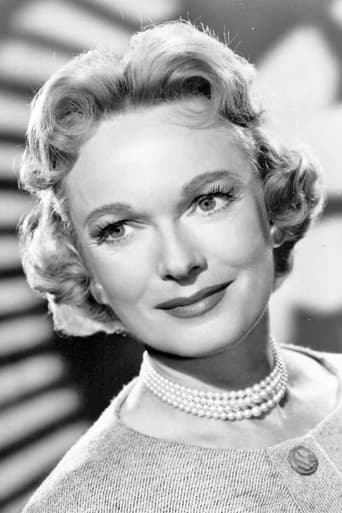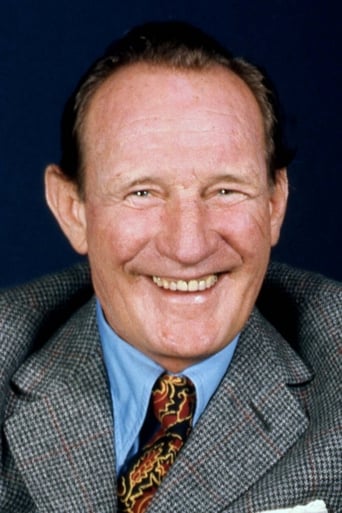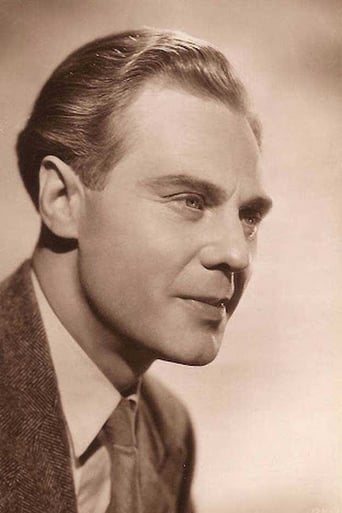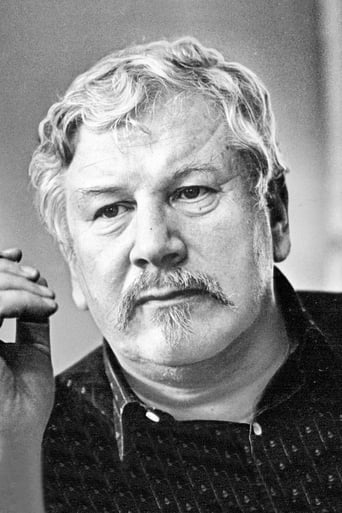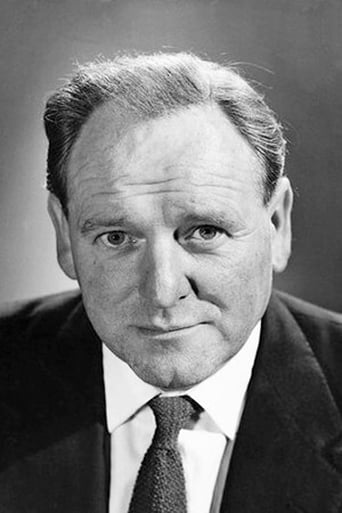Jeanskynebu
the audience applauded
Gurlyndrobb
While it doesn't offer any answers, it both thrills and makes you think.
Allison Davies
The film never slows down or bores, plunging from one harrowing sequence to the next.
Marva
It is an exhilarating, distressing, funny and profound film, with one of the more memorable film scores in years,
rdolan9007
The film Odette, I think, is less well known than 'Carve her name with pride' - a film that deals with fairly similar wartime themes and is also based on a true story. I do think that Odette probably suffers, but only slightly in comparison, as it is a little too stolid in places. Both films would make excellent companion pieces, however, and 'Odette' is certainly well worth watching.Odette is about a French women (Odette) who is sent to France as part of SOE. She has initially been sent to work with the French resistance around the important wartime port of Marseille. Whilst there she gradually falls in love with a British resistance man (Trevor Howard) who is also working undercover in France. Their relationship builds slowly through the film, surviving both prison and torture by the Gestapo, until after their terrible experiences they are reunited in Britain.The love story is mostly understated, but underscores the nature and real danger of 'resistance' work in France. The film is sometimes a little stiff upper lipped and can be a little jarring, but the important scenes are done very well.Those scenes include the torture of 'Odette' although the violence to her is not shown. The menace is there though in the framing of the scene, and you see a gestapo man take a red hot poker out of a stove, with the clear implication that he will burn her back with it. She also has her toe-nails pulled out, although we do not see that portrayed in the film. While the suggestion of Gestapo violence is palpable, it is the scene after her torture that sticks in the mind. You can see the pain seemingly etched in her face, her hair bedraggled, and clinging with sweat to her forehead.It is a very powerful scene, which works extremely well in expressing the torment she went through. Strangely and unfortunately enough the film probably doesn't exude enough menace early on. The acting is good as you might expect from Trevor Howard. Anna Neagle who plays Odette is good as well. There is a nice cameo from Peter Ustinov as a French and occasionally grumpy wireless operator.There is some attempt not to simply have all the Germans as one dimensional. The main German antagonist (Marius Goring) does portray a more complex German. He does not like the Gestapo and their methods, even if, as is pointed out, he goes along with what they do.The other notable scene includes the concentration camp 'Ravensbruck' were the story becomes even darker. Odette is tortured by being imprisoned in solitary confinement with little or no food, and with the heating deliberately turned up to as hot as possible. She nearly dies from this, although she is given slightly better treatment after that. The sadism of the German women guards is hinted at in the film, although not in its probably horrifying detail. Odette is eventually rescued by the camp commander, who tries to save his own skin by releasing her to the advancing Americans.There is some humour despite the dark material in the film, but it is mostly rather forced and stilted. I think the film is probably overlong, and the script lacks bite early on. The film is of its time, and the film probably softens some scenes that a modern audience would probably expect to see.It does a mostly successful job, however, of explaining 'Odettes' story; she did receive a well deserved 'George Cross' for her bravery. I think this is an important film, not simply for its look at her work in the French resistance, but for her confinement in Ravensbruck, were many brave women would not survive the war in that camp. They were often executed there, or basically left to die.If you are interested there is a Wikipedia page dedicated to the prominent women who died in Ravensbruck, and it also contains more sobering detail on the nature of the suffering they endured.I don't this film ranks as one the great war films, the script is a little leaden at times, and until later on in the film there is not that feeling or menace your might expect. I would recommend it none the less, the story is compelling enough to overcome the difficulties with the script.
morphyesque
Being a connoisseur of 1940/early 50s films with an extensive collection, I was surprised that I had never seen "Odette" before but have now done so courtesy of Youtube.The plot is similar to "Carve her name with pride"(1956) starring Virginia McKenna), that is a French woman living in the UK who volunteers to help the allies and Resistance in France during WW11.Anna Neagle showed her lack of linguistic ability speaking French & lapsing into English several times even when speaking to French Resistance workers.On the other hand the German speaking actors were quite authentic in their roles with the producers NOT providing English sub-titles in certain German only sequences where the action was clear.Still it did give Dame Anna a chance to do a spot of real acting and "suffer" for us on screen with Trevor Howard's nicely understated performance playing her husband, Peter Churchill.I do understand that film censorship in 1950 could not allow any special effects showing Anna Neagle's character having her toenails being pulled out by the Gestapo, even suggesting it was slightly shocking then.Marius Goring was often well cast in sinister yet intelligent roles as he plays here as an officer in the Deutsche Abwehr.Another role he played in the same year of 1950 was as a Balkan/Serbian police inspector with Margaret Lockwood in "Highly Dangerous".Good to see "M"(a youngish Bernard Lee) initially from "Dr.No (1962) learning his trade in military intelligence.I awarded this film 6/10.
Jonathon Dabell
A truly inspirational real-life war hero(ine), Odette Sanson's story is so dramatic and fascinating that it's eventual translation to the cinema screen is as inevitable as night following day. Tastefully done yet still powerful – with strong performances from Anna Neagle, Trevor Howard, Marcus Goring and Peter Ustinov – the film is a good, solid bio-pic all-round.During WWII, mother of three Odette Sanson (Anna Neagle) offers to work for British Intelligence. She is given a new identity and back-story, and dispatched to France where she comes under the command of top Allied spy Peter Churchill (Trevor Howard). Churchill has within his jurisdiction a small spy network working furtively and endlessly against the German war machine, among them the impetuous and courageous Alex Rabinovich (Peter Ustinov). Odette proves her own worth smuggling some vital documents out of Marseille, and is soon hailed as one of the most invaluable members of the team. Later she is captured and tortured by the Gestapo, but stubbornly refuses to yield any information, simultaneously surprising and infuriating her Nazi captors. After various trials and tribulations, she returns to England a bona fide war hero(ine) when the fighting ends in 1945.After a stodgy and rather clumsily handled opening, Odette picks up pace, interest and drama as it gets going. Neagle handles the title role pretty well, conveying the stubborn pride and inner courage of the character most effectively; Howard too is solid (if a little underused) as her superior and eventual lover. The film is crisply shot, sometimes on the studio backlot but quite often on authentic continental locations, and generates an evocative sense of atmosphere in its dangerous world of wartime skulduggery and military intrigue. The torture sequences manage to be extremely distressing without showing everything in nauseating detail (a trick modern film-makers would do well to learn from), and a good level of tension is sustained pretty much throughout as Odette carries out her clandestine deceptions in this riskiest of times and places. All-in-all, Odette is a good film in the old-fashioned mould.
blanche-2
Anna Neagle is "Odette" in this story of a war heroine, based on the adventures of Odette Sansom. Her costars are Trevor Howard, Marius Goring, and Peter Ustinov.Odette is drafted by the government into spy work after she hears on the radio that Admiralty are asking for photos taken during vacations and trips overseas for possible war use. Odette sends her info to the wrong office and before she knows it, she is drafted as a spy and sent to France to work with the resistance, her three daughters left in a convent school.There, she meets Peter Churchill, code name Raoul, who is to be her supervisor. She is given the name Lise. Unfortunately a double agent reports them and both are captured and tortured by the Gestapo. Odette tells the Gestapo that she is married to Peter Churchill and that he is related to Winston Churchill (he isn't) in the hopes that the Nazis won't kill them.I really loved this movie but what happens to Churchill and Odette is given away in the opening credits, so there are no surprises. There is, however, a lot of suspense, and there are wonderful performances by everyone involved. I didn't care for Marius Goring in "The Red Shoes" - he just wasn't leading man enough for me, but he always made a very effective villain. As a German officer, he does a great job here. Peter Ustinov, as a fellow agent of Lise's and Raoul's, is young and likable in his role, which, despite its seriousness, he tackles with a light touch. Trevor Howard is solid as Peter, and Anna Neagle is lovely and extremely effective as Odette.The real Odette, as we know from those opening credits, does marry Peter Churchill, but they divorced in 1956 and she married a third time. (Her first husband actually died while she was imprisoned by the Nazis, though the film says they are separated.) She was given the legion d'honneur for her war work. Her life was very interesting - as a child she had polio and was blind and crippled for a year. She died in 1995 at the age of 82.Before Odette died, her legion d'honneur Gold Cross was stolen. She made a public appeal and it was returned with the following note: "You, Madame, appear to be a dear old lady. God bless you and your children. I thank you for having faith in me. I am not all that bad - it's just circumstances. Your little dog really loves me. I gave him a nice pat and left him a piece of meat - out of fridge. Sincerely yours, A Bad Egg." Well worth checking out.
